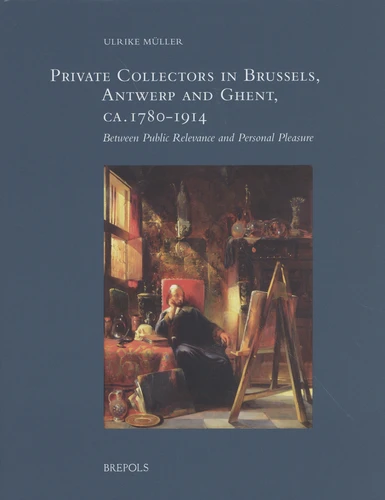- Accueil /
- Ulrike Müller
Ulrike Müller

Dernière sortie
Private Collectors in Brussels, Antwerp, and Ghent, ca. 1780-1914
In the first half of the nineteenth century, Belgium was repeatedly praised as a country of collectors and amateurs, and private art and antique collectors were important and highly visible actors in urban cultural life. At a time when the public museum was still a relatively recent innovation, private collections were quite easily accessible for local and international visitors of the same social rank as the collectors.
By the beginning of the twentieth century, however, the collector's position in the public sphere had changed dramatically. Private collections were less accessible to an ever-expanding and increasingly culture-consuming public, and functioned more strongly in the context of the personal and explicitly private aims and networks of their owners. This book uncovers the premises and reasons for private collectors' shifting public role and relevance in nineteenth-century Brussels, Antwerp and Ghent.
By the beginning of the twentieth century, however, the collector's position in the public sphere had changed dramatically. Private collections were less accessible to an ever-expanding and increasingly culture-consuming public, and functioned more strongly in the context of the personal and explicitly private aims and networks of their owners. This book uncovers the premises and reasons for private collectors' shifting public role and relevance in nineteenth-century Brussels, Antwerp and Ghent.
In the first half of the nineteenth century, Belgium was repeatedly praised as a country of collectors and amateurs, and private art and antique collectors were important and highly visible actors in urban cultural life. At a time when the public museum was still a relatively recent innovation, private collections were quite easily accessible for local and international visitors of the same social rank as the collectors.
By the beginning of the twentieth century, however, the collector's position in the public sphere had changed dramatically. Private collections were less accessible to an ever-expanding and increasingly culture-consuming public, and functioned more strongly in the context of the personal and explicitly private aims and networks of their owners. This book uncovers the premises and reasons for private collectors' shifting public role and relevance in nineteenth-century Brussels, Antwerp and Ghent.
By the beginning of the twentieth century, however, the collector's position in the public sphere had changed dramatically. Private collections were less accessible to an ever-expanding and increasingly culture-consuming public, and functioned more strongly in the context of the personal and explicitly private aims and networks of their owners. This book uncovers the premises and reasons for private collectors' shifting public role and relevance in nineteenth-century Brussels, Antwerp and Ghent.
